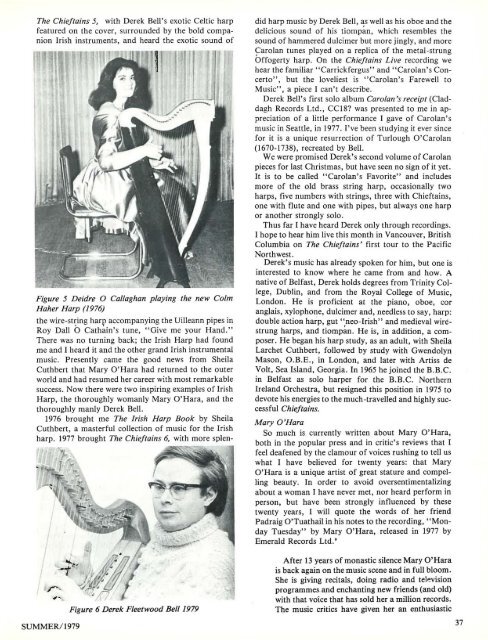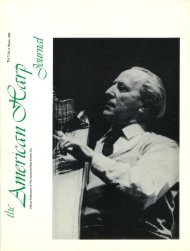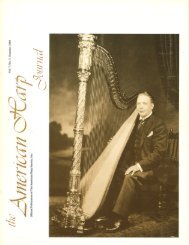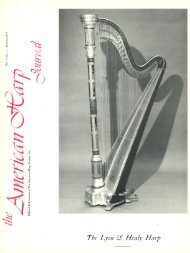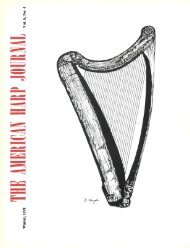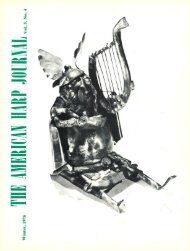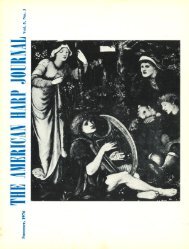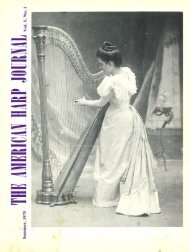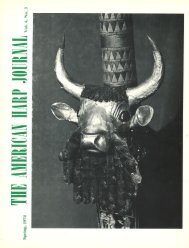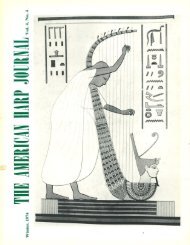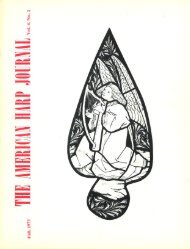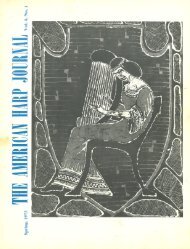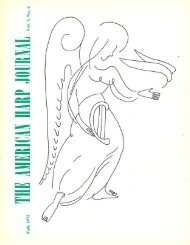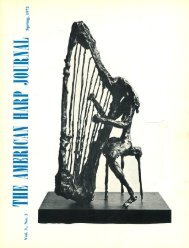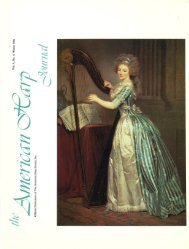AHJ, Vol. 7 No. 1, Summer 1979
AHJ, Vol. 7 No. 1, Summer 1979
AHJ, Vol. 7 No. 1, Summer 1979
You also want an ePaper? Increase the reach of your titles
YUMPU automatically turns print PDFs into web optimized ePapers that Google loves.
The Chieftains 5, with Derek Bell's exotic Celtic harp<br />
featured on the cover, surrounded by the bold companion<br />
Irish instruments, and heard the exotic sound of<br />
Figure 5 Deidre O Callaghan playing the new Colm<br />
Haher Harp (1976)<br />
the wire-st~ing hari;i accompanying the Uilleann pipes in<br />
Roy Dall O Cathain's tune, "Give me your Hand."<br />
There was no turning back; the Irish Harp had found<br />
me and I heard it and the other grand Irish instrumental<br />
music. Presently came the good news from Sheila<br />
Cuthbert that Mary O'Hara had returned to the outer<br />
world and had resumed her career with most remarkable<br />
success. <strong>No</strong>w there were two inspiring examples of Irish<br />
Harp, the thoroughly womanly Mary O'Hara, and the<br />
thoroughly manly Derek Bell.<br />
1976 brought me The Irish Harp Book by Sheila<br />
Cuthbert, a masterful collection of music for the Irish<br />
harp. 1977 brought The Chieftains 6, with more splen-<br />
SUMMER/<strong>1979</strong><br />
Figure 6 Derek Fleetwood Bell <strong>1979</strong><br />
did harp music by Derek Bell, as well as his oboe and the<br />
delicious sound of his tiompan, which resembles the<br />
sound of hammered dulcimer but more jingly, and more<br />
Carolan tunes played on a replica of the metal-strung<br />
Offogerty harp. On the Chieftains Live recording we<br />
hear the familiar "Carrickfergus" and "Carolan's Concerto",<br />
but the loveliest is "Carolan's Farewell to<br />
Music", a piece I can't describe.<br />
Derek Bell's first solo album Carolan's receipt (Claddagh<br />
Records Ltd., CC18? was presented to me in appreciation<br />
of a little performance I gave of Carolan's<br />
music in Seattle, in 1977. I've been studying it ever since<br />
for it is a unique resurrection of Turlough O'Carolan<br />
(1670-1738), recreated by Bell.<br />
We were promised Derek's second volume of Carolan<br />
pieces for last Christmas, but have seen no sign of it yet.<br />
It is to be called "Carolan's Favorite" and includes<br />
more of the old brass string harp, occasionally two<br />
harps, five numbers with strings, three with Chieftains,<br />
one with flute and one with pipes, but always one harp<br />
or another strongly solo.<br />
Thus far I have heard Derek only through recordings.<br />
I hope to hear him live this month in Vancouver, British<br />
Columbia on The Chieftains' first tour to the Pacific<br />
<strong>No</strong>rthwest.<br />
Derek's music has already spoken for him, but one is<br />
interested to know where he came from and how. A<br />
native of Belfast, Derek holds degrees from Trinity College,<br />
Dublin, and from the Royal College of Music,<br />
London. He is proficient at the piano, oboe, cor<br />
anglais, xylophone, dulcimer and, needless to say, harp:<br />
double action harp, gut "neo-Irish" and medieval wirestrung<br />
harps, and tiompan. He is, in addition, a composer.<br />
He began his harp study, as an adult, with Sheila<br />
Larchet Cuthbert, followed by study with Gwendolyn<br />
Mason, O.B.E., in London, and later with Artiss de<br />
<strong>Vol</strong>t, Sea Island, Georgia. In 1965 he joined the B.B.C.<br />
in Belfast as solo harper for the B.B.C. <strong>No</strong>rthern<br />
Ireland Orchestra, but resigned this position in 1975 to<br />
devote his energies to the much-travelled and highly successful<br />
Chieftains.<br />
Mary O'Hara<br />
So much is currently written about Mary O'Hara,<br />
both in the popular press and in critic's reviews that I<br />
feel deafened by the clamour of voices rushing to tell us<br />
what I have believed for twenty years: that Mary<br />
O'Hara is a unique artist of great stature and compelling<br />
beauty. In order to avoid oversentimentalizing<br />
about a woman I have never met, nor heard perform in<br />
person, but have been strongly influenced by these<br />
twenty years, I will quote the words of her friend<br />
Padraig O'Tuathail in his notes to the recording, "Monday<br />
Tuesday" by Mary O'Hara, released in 1977 by<br />
Emerald Records Ltd. 9<br />
After 13 years of monastic silence Mary O'Hara<br />
is back again on the music scene and in full bloom.<br />
She is giving recitals, doing radio and television<br />
programmes.and enchanting new friends (and old)<br />
with that voice that has sold her a million records.<br />
The music critics have given her an enthusiastic<br />
37


